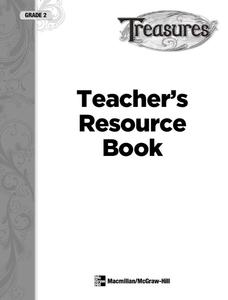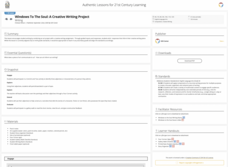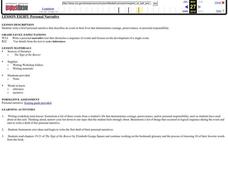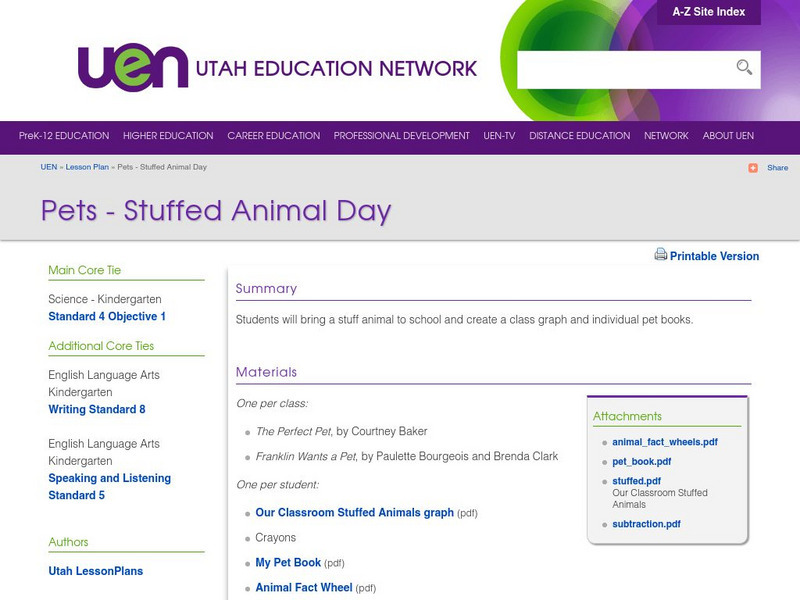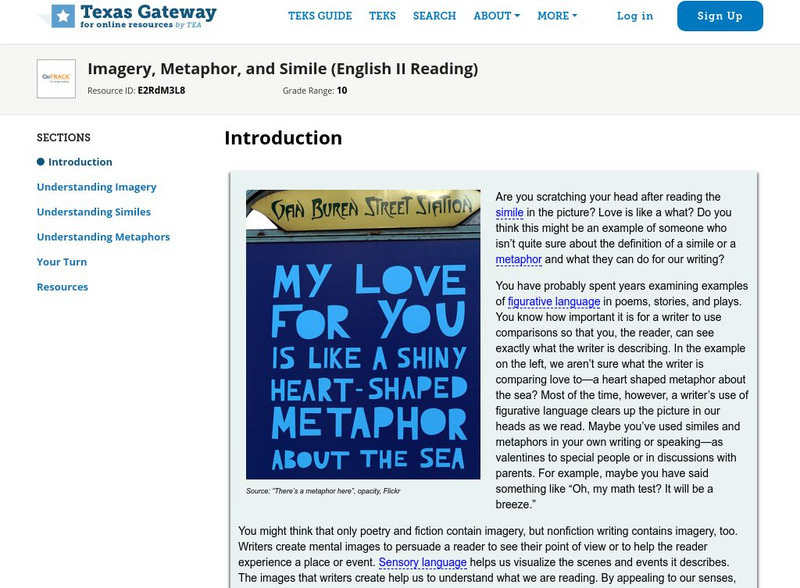McGraw Hill
Phonics Teachers Resource Book
Looking to improve your classes literacy program? Then look no further. This comprehensive collection of resources includes worksheets and activities covering everything from r-controlled vowels and consonant digraphs, to the...
K20 LEARN
Windows To The Soul: A Creative Writing Project
The eyes have it in a project that combines art with creative writing. Class members list three adjectives or characteristics of a person they admire. Then draw a picture of a pair of eyes that they feel reflects these characteristics....
Teaching Tolerance
Puppet Show
It's a play, it's a story, it's a puppet show! A lively resource provides academics with a creative outlet to express their views on diversity and social justice. Scholars are responsible for writing, creating, and performing a puppet...
Teaching Tolerance
Community Bulletin Board
A project-based lesson has pupils create a bulletin board to share artwork, nonfiction articles, and messages based on social justice themes. The finished board is displayed in the community to create a place for discussion.
Teaching Tolerance
Community Newsletter
What does it take to develop and publish a newsletter? Young academics create a newsletter with original artwork for their school or community. They explore social justice themes and spread messages of tolerance and inclusion. Scholars...
American Press Institute
In the Newsroom: The Fairness Formula
Reporting the news is easy, right? Think again! Show young scholars the difficult choices journalists make every day through a lesson that includes reading, writing, and discussion elements. Individuals compare the language and sources...
Dream of a Nation
Writing an Analytic Essay
After researching an issue introduced in Tyson Miller's Dream of a Nation: Inspiring Ideas for a Better America, writers develop an original thesis statement and craft an analytic essay using evidence collected in their research.
Student Handouts
Why Does an Author Write?
To get to the heart of a writer's purpose, just remember to have some PIE (Persuade, Inform, or Entertain)! And appropriately, here is a PIE chart that leaves room for pupils to identify each letter of the acronym and any other...
Curated OER
This is Your Lifeline!
For this writing worksheet, learners participate in writing their personal lifelines. Students finish the sentences about what they could do at each age of life, ending with what they want to learn. Learners then complete a "Star of the...
Curated OER
All About Our Town
Pupils explore brochure writing. They work in groups to brainstorm and categorize important places in their community. In addition, they gather information from the Internet, take pictures using a digital camera, and create a community...
Curated OER
Check it Out...Nonfiction Can Be Fun!
Organizing information gathered for a research topic can be a challenge. Read aloud notes you have collected on a topic and use suggestions offer by the class to categorize and sort this information. Partners then follow this pattern,...
Curated OER
Research
This research PowerPoint provides questions to consider when selecting a research topic. Emerging writers consider their purpose for writing and the audience they are writing for, and then practice narrowing down a topic given a list of...
Curated OER
Identifying Features of Nonfiction Text
Learners explore nonfiction text. They identify the cover, title page, and table of contents of a nonfiction book. Pupils work in groups to create a chapter for a nonfiction class book about heroes.
Curated OER
K-W-L Chart
After choosing a topic of interest, young learners use the K-W-L thinking process to create an informational, illustrated, big book. K-W-L, a three-part thinking process, asks the learner to respond to three questions: What do we know...
Curated OER
Compare and Contrast Nonfiction Texts
Explore nonfiction writing by comparing and contrasting two different texts. After reading two nonfiction books, articles, or magazines, students utilize a graphic organizer to record their similarities and differences. They answer study...
Curated OER
Arctic
While you'll have to create an assignment sheet for a research project focusing on the arctic, you could use this sheet when it comes time to write the final draft. The title is already printed, and there's a cute penguin in the bottom...
Curated OER
You Be the Judge
Students explore nonfiction writing by completing a worksheet in class. For this research questions lesson, students read several stories about the Wild West icons Wyatt Earp and Wild Bill Hickok. Students answer study questions about...
Curated OER
Personal Narrative
Students explore personal stories by investigating narrative writing. In this nonfiction writing lesson, students participate in a workshop in which they write three events from their own life. Students write first drafts of these...
Utah Education Network
Uen: Pets: Stuffed Animal Day
This lesson requires students to bring a stuffed animal to school. During the lesson, students will create a class graph and individually author their own nonfiction pet books after conducting research.
Grammarly
Grammarly Handbook: Transitions and Transitional Devices
This Grammarly Handbook resource provides information about how to use transition words and transitional devices to connect sentences, paragraphs, and sections in an essay.
Other
Wic Biography Index
This site lists biographies of Living Legacy Award recipients and other exceptional female humanitarians alphabetically.
Other
Biographical Dictionary
Students are able to connect to a search engine containing a dictionary that "covers more than 28,000 notable men and women who have shaped our world from ancient times to present day."
Other
Allwritewithme: Rubrics & Checklists for Fourth Grade Informative Writing
This collection of rubrics and checklists can be used for formative and summative assessments. Students can use many of these to self-assess during various phases of the informative writing process, and teachers may use these to guide...
Texas Education Agency
Texas Gateway: Literary Text: Imagery, Metaphor, and Simile
Writers use sensory imagery ("smelled the salty air"), similes ("like a strong man playing tug-of-war"), and metaphors ("the waves roaring in my ears") to capture the reader's imagination. In this lesson, you will learn how to identify...


